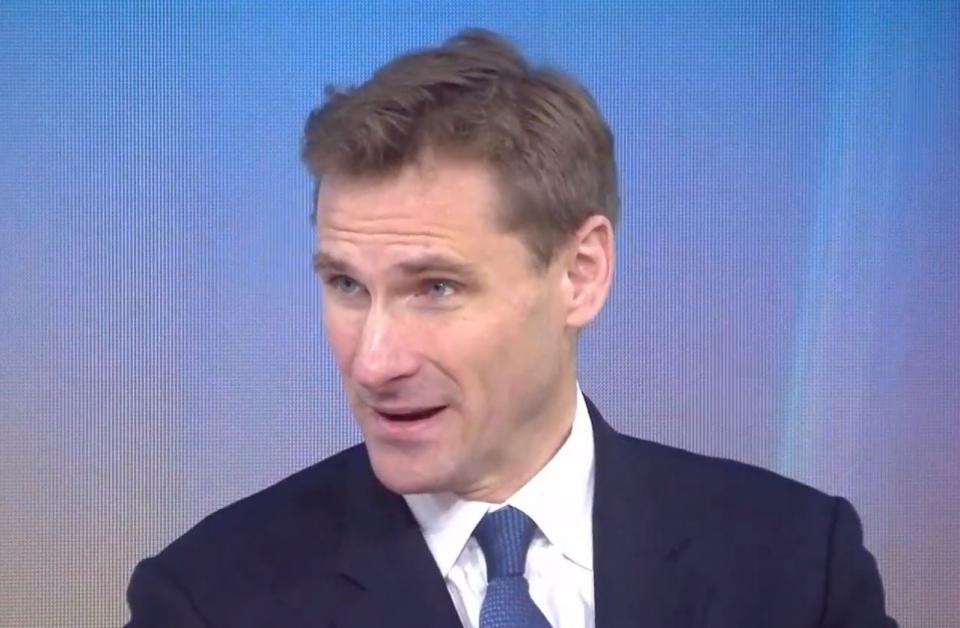Covid Inquiry LIVE: Boris booed as he leaves inquiry after saying he should have 'twigged' seriousness of Covid earlier
- Oops!Something went wrong.Please try again later.
Boris Johnson was booed as he left Dorland House following a day of giving evidence to the Covid inquiry.
Crowds of bereaved family members shouted at the former prime minister as he left the building in west London on Wednesday evening.
It comes after the former prime minister admitted he should have "twigged much sooner" when the pandemic took hold in Italy in February 2020.
Mr Johnson led the country throughout the pandemic, and Module 2 of the inquiry is scrutinising his decisions at the time.
Questioning was set to focus on lockdown timings and the reported “toxic” environment in Downing Street, as well as the boozy illegal gatherings which ultimately led to Mr Johnson’s downfall.
The ex-PM arrived three hours early for the first of two days of expected testimony.
It meant he avoided protesters who began gathering outside the inquiry building in Paddington shortly before 8am.
Follow latest updates below...
Key Points
Boris Johnson apologies and says inquiry needs to 'get answers'
Four women removed from inquiry
Matt Hancock's 'incompetence' killing 'god knows how many'
That's all from us today
18:17 , Daniel Keane
We'll be back tomorrow with the latest from the Covid inquiry.
What did we learn from Johnson's evidence?
17:53 , Daniel Keane
Boris Johnson mounted a defence of his management of the pandemic at the Covid inquiry on Wednesday.
Here are the main things we learned from the former Prime Minister's evidence:
- Mr Johnson admitted he should have “twigged much sooner” about the threat posed by Covid-19 in the early days of the pandemic
- He rejected accusations he had shown poor leadership by oscillating over whether to back tough restrictions in the early months of 2020
- Mr Johnson defended his eventual decision to order England’s first lockdown, saying by the middle of that month he was giving arguments against restrictions “pretty short shrift”
- He also defended his Downing Street operation from claims there was “internecine warfare”, saying “it was better on the whole for the country to have a disputatious culture in No 10"
Boris Johnson booed as he leaves Covid inquiry
17:18 , Daniel Keane
Boris Johnson has ended his day of testimony to the Covid inquiry.
Crowds of bereaved family members shouted at the former prime minister as he left Dorland House in west London on Wednesday evening.
The word “liar” could be heard among the jeers as he entered an awaiting vehicle.
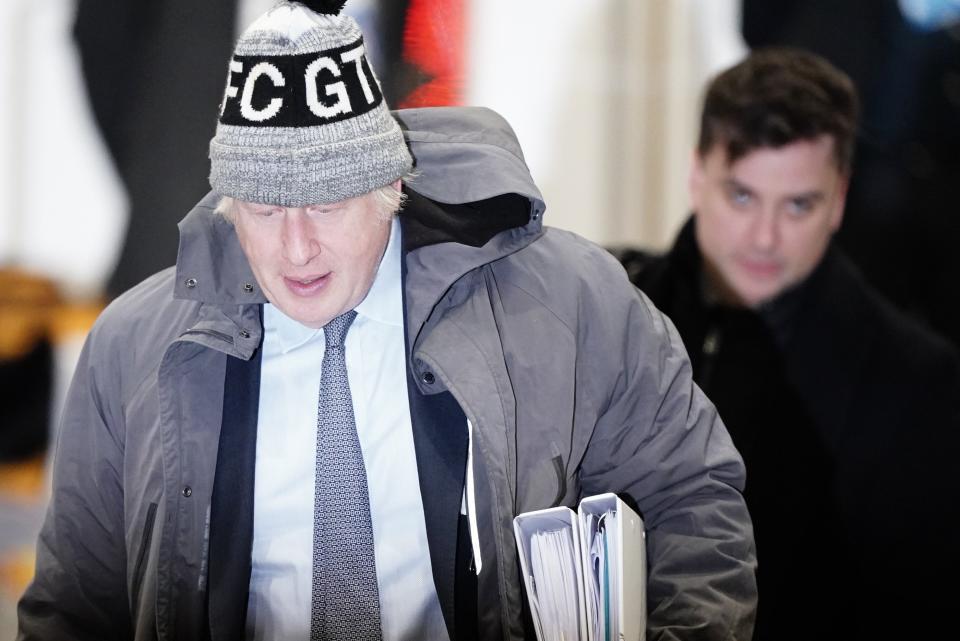
Johnson saw no need to sack Matt Hancock despite pressure
16:57 , Daniel Keane
Boris Johnson thought Matt Hancock was doing a "good job" as health secretary and felt there was no guarantee he would be “trading up” if he put someone else in.
The former health secretary has been criticised by a number of witnesses at the inquiry, including Dominic Cummings and former civil service chief Lord Sedwill.
Mr Johnson told the inquiry: “I was aware that the DHSC (Department of Health and Social Care) was under fire from loads of people, but that was hardly surprising, because the country was going through a horrific pandemic.”
He added: “You’ve got a lot of very talented sometimes super-confident, sometimes egotistical, people who are crushed with anxiety about what is happening to their country, who are wracked secretly with self-doubt and self-criticism and who externalise that by criticising others. And it’s human nature.
“When you’re the leader in those circumstances, your job is to work out what is justified and what is people sounding off and what is political nonsense.
“And my judgment was that Matt was, on the whole, doing a good job in very difficult circumstances and there was no advantage in moving him as I was being urged to do, that was my judgment."
Johnson defends 'blunt' culture in No10
16:46 , Daniel Keane
Boris Johnson defended the culture in his No10 by saying he spoke “bluntly” in meetings to encourage others to do the same.
Inquiry lawyer Hugo Keith KC highlighted allegations of a toxic, misogynistic culture in Downing Street during the pandemic.
Responding to the claims, Mr Johnson said that he wanted staff to "speak their minds without fear of being embarrassed" in meetings.
“That’s one of the reasons, by the way, why I sometimes spoke bluntly and freely in meetings. I wanted to give everybody cover to do the same. I wanted people to feel that they could, if they had an idea, that I wanted to hear it.”
Johnson apologises for 'Gulf War Syndrome' comment about long Covid
16:22 , Daniel Keane
Boris Johnson said he regretted comparing long Covid to “Gulf War Syndrome”.
The Covid-19 Inquiry was shown a document from October 2020, in which Mr Johnson described the condition as "bo******".
The former prime minister said: “The words that I scribbled in the margins of submissions about long Covid have obviously been now publicised and I’m sure that they have caused hurt and offence to the huge numbers of people who do indeed suffer from that syndrome.
“And I regret very much using that language and I should have thought about the possibility of future publication.”
Boris Johnson defends excluding Sadiq Khan from Cobra
16:01 , Rachael Burford
Boris Johnson defends not inviting Sadiq Khan to early Cobra meetings as Covid swept the capital.
In his evidence last week, the Mayor of London said local leaders were generally given insufficient information from Downing Street.
Mr Khan said he made "repeated requests" to attend Cobra meetings on March 2, 9 and 12, but was not allowed to come.
Mr Johnson says that the Mayor was "repeatedly consulted" and an initial idea to impose harsher lockdown measures in London ahead of the rest of the country was dropped.
Matt Hancock concerned about coming out of lockdown early
15:39 , Rachael Burford
Former Health Secretary Matt Hancock was concerned about coming out of lockdown too quickly, WhatsApp messages reveal.
In the exchange with Boris Johnson in July 2020, Mr Hancock said he was "very worried about winter" and "we've gone fast on releasing lockdown".
New cases of the virus were beginning to rise and he was getting "no traction on doing what's needed to protect the NHS", he said in the messages.
Mr Johnson says the inquiry should remember Mr Hancock was considering his department's budget and wanted more money for the health service.
Lack of data on early lockdowns 'concerning'
15:13 , Rachael Burford
Days after he announced a full lockdown on March 23 2020, Boris Johnson says he expressed concern about the lack of data and information on the impact it would have.
In WhatsApp messages shared with the inquiry dated March 26, he said that he agreed with "every word" of an article by Prof John Lee in the Spectator magazine.
"We have no idea how many Covid deaths are truly additional," he said
"When Covid fatalities are recorded we have no idea whether it is merely present or actually the cause of death.
"We have no idea what proportion may have had the disease asymptomatically already."
He added: "So we have taken these extraordinary steps without being truly sure how deadly it is."
Not locking down idea given 'short shrift'
15:07 , Rachael Burford
The chair of the inquiry Baroness Hallett interrupts to ask Boris Johnson if he considered the argument of not locking down and avoiding "draconian measures".
"I did," he says. "I'm afraid to say at that stage I gave it pretty short shrift."
It was his job to "protect human life", he says and there was a "very real" risk of scenes similar to those in Italy happening in the UK if the NHS was overwhelmed.
Earlier he said: "Our objective was to protect the NHS and save lives and to save lives by protecting the NHS - that was our objective.
"Our strategy was to suppress the curve and to keep the R below 1 as much as we could. And we're going to use everything we could to do that. Herd immunity was going to be, we hoped, a by-product of that campaign which might be very long and very difficult."
In WhatsApp messages dated March 14 with Matt Hancock and Sir Patrick Vallance, Boris Johnson said he was "concerned when some on teams were suggesting last week that we actively need a proportion of pop to be infected.
"Civil service need to grasp."
Moment PM realised there was 'massive problem'
14:50 , Rachael Burford
Boris Johnson says "we knew we had a massive problem" on March 13 or 14, 2020.
He adds: "We knew we were probably going to have to act in ways that we hadn't bargained for and were still being developed. We still thought we had a bit of time, but not very much probably, and that was what the scientific guidance seemed to say.
"If you look at that long paper by Sage on the on the 12th, you can see quite a bit of it."
He said by the 13th it was clear through Sage that the virus was spreading more rapidly than thought.
Covid graphs 'bewildering'
14:25 , Rachael Burford
Graphs detailing the effect of implementing, or not implementing, Covid measures are shown to the inquiry.
They had been shown to Mr Johnson at a Cobra meeting on March 12, 2020.
Mr Johnson says he was "bewildered" by them.
"I remember thinking in either case we are facing an absolutely intolerable situation," he says.
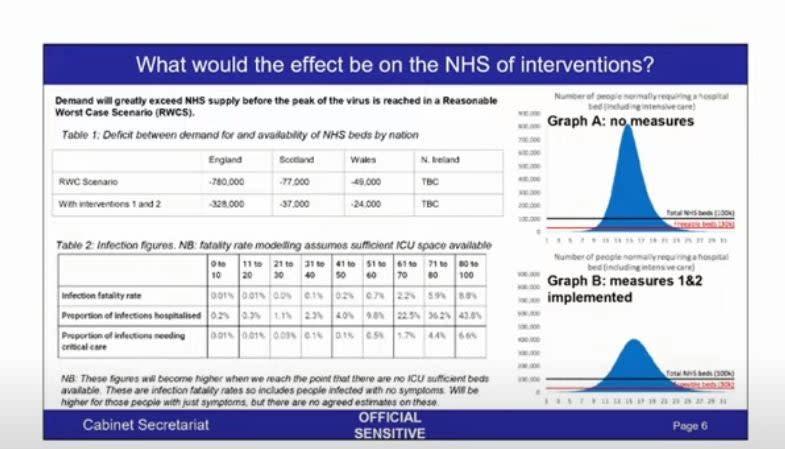
'I shouldn't have shook hands at London hospital', admits Boris
14:04 , Rachael Burford
As the inquiry gets back underway after lunch, Boris Johnson admits that he "shouldn't have" shaken hands with people during a visit to a hospital weeks before announcing the first lockdown.
The PM met patients at the Royal Free Hospital in London on March 1 2020.
Hugo Keith KC asks if Mr Johnson had seen advice against greetings such as shaking hands.
"I didn't, but I do think that I shouldn't have done that in retrospect," Mr Johnson says.
"I should have been more precautionary, but I wanted to be encouraging to people."
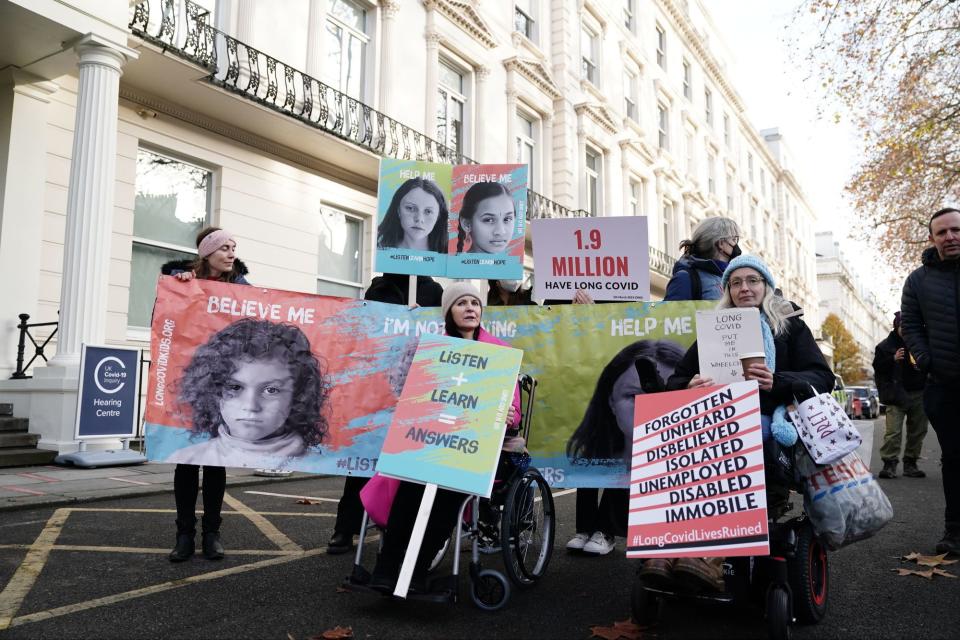
Johnson accused of "gross distortion of the truth"
13:41 , Tom Davidson
Boris Johnson’s claim that his Government saved thousands of lives during the pandemic is a “gross distortion of the truth”, a lawyer for bereaved families has said.
Aamer Anwar, lead solicitor for the Scottish Covid Bereaved group, told a press conference in west London: “Mr Johnson apologised today, but that apology is not accepted by many of the bereaved because he also claimed the Government saved thousands of lives.
“And that, for many, is a gross distortion of the truth.
“Instead of solving a national crisis, Boris Johnson, in his own words, presided over a total disgusting orgy of narcissism.
“Millions of frontline workers risked their lives without adequate PPE.
“Johnson’s government turned our care homes into killing grounds for the elderly, who were treated as toxic waste.
“We wasted £37 billion on a failed track and trace system.
“All the while, Johnson and his cabinet were living it up in parties, insulting the dead, the poor, and the vulnerable.”
Johnson found it "hard to conceptualise" alternatives to NPIs
13:04 , Tom Davidson
Before breaking for lunch Boris Johnson told the pandemic inquiry that in early March 2020 he found it “hard to conceptualise” what else the Government should be doing apart from non-pharmaceutical interventions (NPIs).
“I did what I could, I think the problem is that actually, if you exclude borders and test and trace is not as good as it cracked up to be, and if you’re told that we’ve got ample supplies of PPE (personal protective equipment) I was finding it hard to conceptualise exactly what we should be doing, except for the NPIs.
“And that was the only thing that I’d been – I don’t think the concept of lockdown had even emerged (by this point).”
He added: “Although people intellectually can see that the RWCS (reasonable worst case scenarios) could happen, they still don’t think that it’s very likely to happen. And that’s the reality.”
Inquiry breaks for lunch
12:46 , Rachael Burford
The inquiry breaks for lunch. Testimony will begin again at 1.40pm.
PM was 'rattled' by scenes in Italy
12:43 , Rachael Burford
In mid-February 2020 11 municipalities in Italy went into lockdown and there was an outbreak of the virus on the Diamond Princess cruise ship.
"Scenes from Italy really rattled me," Mr Johnson says.
"I remember seeing a note that the fatality rate in Italy was 8% because it had an elderly population."
Mr Johnson admits he should have "twigged much sooner" that Covid was going to be serious.
At the time he says he told colleagues: "I don't like the look of how it's going in Italy at all."
Ministers were 'not as alarmed as they should have been'
12:28 , Rachael Burford
Boris Johnson says that he and others in Government were not as alarmed as they should have been between January and March 2020.
"I certainly would accept that my mindset - like the mindset I think of the overwhelming majority of the ministers and officials in Whitehall in that period Jan to mid-Feb - was not as alarmed as we should have been," he says.
Asked about a text chief adviser Dominic Cummings sent to a "Number 10 action group" on February 6 saying, "We need a briefing on corona tomorrow. Chief scientists told me it's probably out of control now and will sweep the world. Will be major comms exercise".
Mr Johnson replied by text: "Yes please, need to talk about coronavirus comms at 9."
Hugo Keith KC asks why the singular focus was on communications and not enacting a major response.
Mr Johnson replies: "Because I think it's your point about infection fatality rate - the consequences.
"I think that when you read that a... pandemic is about to sweep the world, you think you've heard it before. And that was the that was the problem.
"But I think it'd be fair to say that the scientific community within Whitehall at that stage was not telling us that - I was not being informed that - this was something that was going to require urgent and immediate action."
'Very little' benefit to border controls
12:22 , Rachael Burford
Mr Johnson is asked about advice he was receiving in February about border controls.
He says that the "overwhelming scientific consensus" was that trying to interrupt the virus with tough border restrictions "bought you really very little" benefit.
It would only have delayed the virus entering the UK by a few weeks, he says.
"I think a lot of people in the country found that very difficult to understand."
He adds that the public believed "instinctively you can fix this with tough border controls".
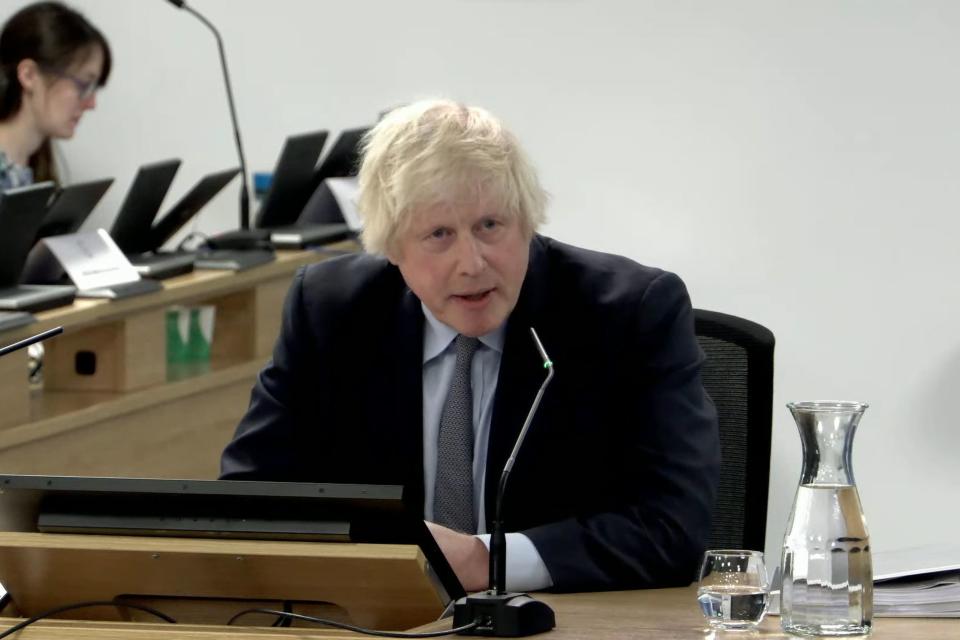
Government would have acted differently if ministers had known about asymptomatic transmission
12:12 , Rachael Burford
There are many things the Government would have done differently if it had realised the virus could spread asymptomatically, Mr Johnson says.
But Hugo Keith KC agues that it was known how Covid was spreading by mid-February and there was still a "failure to act on the information".
The Chief Medical Officer told then Health Secretary Matt Hancock on February 28 that there was credible evidence of asymptomatic transmission in Germany, Mr Keith says.
Mr Johnson says he does not know what people thought about transmission in February and insists he does not recall being told about this conversation. It is possible he has "completely forgotten" it, he adds.
Emergency Cobra meetings did not raise concerns
11:55 , Rachael Burford
Five meetings of the emergency response committee (Cobra) took place over five weeks in January to February 2020.
Asked how he could not have realised Covid was of national concern at the beginning of 2020, Mr Johnson says Cobra meetings are a "regular occurrence".
The virus had not "broken upon the political world" by that point, he says.
He adds that it was not being brought up during Prime Minister's Questions and the World Health Organization only declared the pandemic on March 12.
5,000 missing messages and an apology
11:48 , Rachael Burford
This morning Boris Johnson apologised to people who lost loved ones to Covid and defended losing about 5,000 WhatsApp messages which could not be provided to the inquiry.
The ex-PM acknowledged that “we may have made mistakes” in handling the pandemic.
Here is our full write up of Mr Johnson's evidence so far.
Covid was 'cloud on the horizon'
11:42 , Rachael Burford
Between January and February 2020 Covid was a "cloud on the horizon", says Mr Johnson.
He remembers a conversation on January 7 where he said "keep an eye on it".
"In government it wasn't being escalated as something for national concern," Mr Johnson tells the inquiry.
But there was "a crescendo of activity" towards the end of February, he adds.
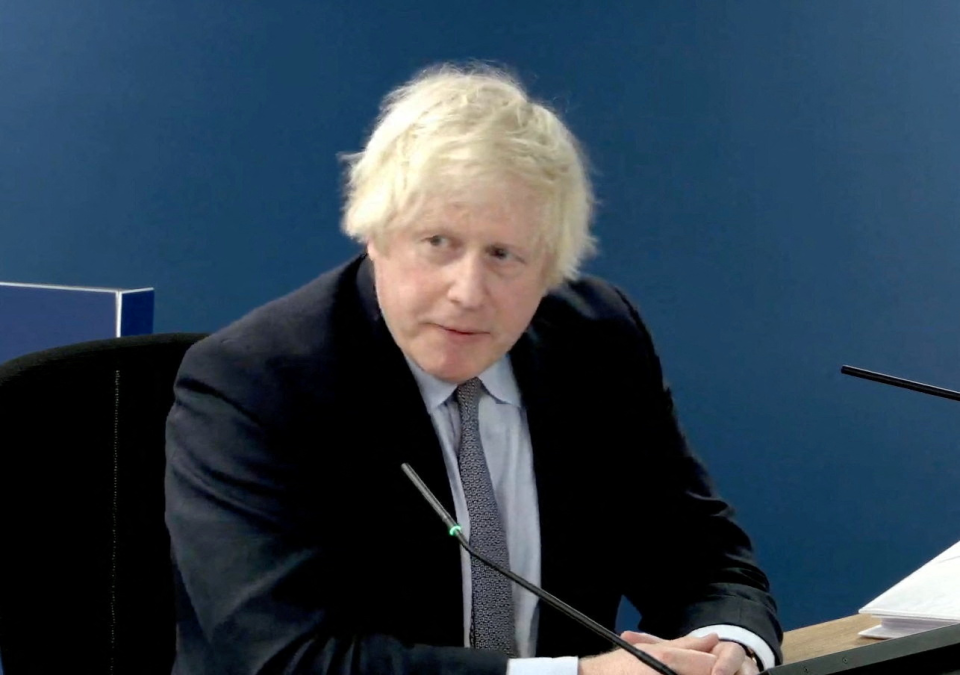
Boris Johnson: 'I needed more women'
11:25 , Rachael Burford
Boris Johnson tells the inquiry that his administration had a lot of "challenging and competing characters but it got "an awful lot done".
However the ex-PM says he regrets not having more women in top positions and it was something that he "should have done better".
"I think that the gender balance of my team should have been better," he said.
"I think sometimes during the pandemic, too many meetings were too male-dominated if I'm absolutely honest with you."
No 'toxic atmosphere' in No10
11:18 , Rachael Burford
Boris Johnson says he was "not aware" of a "toxic atmosphere" in Downing Street,
Ex-civil servant Helen MacNamara has accused Dominic Cummings of creating the poisonous work environment.
Mr Johnson says: "First of all, no, I was not aware of that. Secondly, I didn't see any sign of that."
Matt Hancock's 'incompetence' killing 'god knows how many'
11:07 , Rachael Burford
Boris Johnson is shown profanity-filled messages he received from then advisor Dominic Cummings in May 2020.
They described former Health Secretary Matt Hancock as "useless" and "unfit for the job". Mr Johnson says that the PM is "constantly" being lobbied to sack somebody by somebody else.
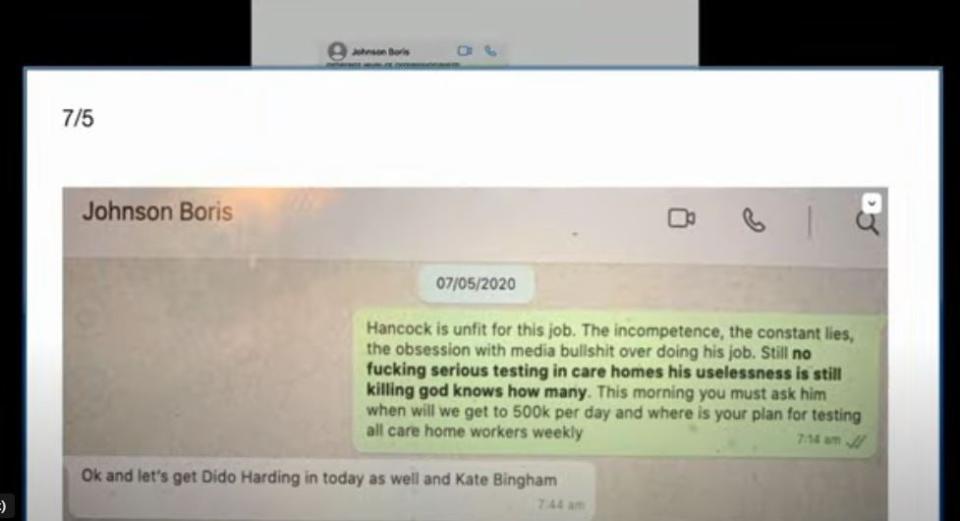
Rishi Sunak's "influence"
11:00 , Rachael Burford
Then Chancellor Rishi Sunak "had considerable influence over the decision making process", Hugo Keith KC says.
He points to a number of meetings and the introduction of theEat Out to Help Out scheme.
There were "no minutes" of these talks, he said.
Mr Johnson replies. "I think that certainly there was transparent economic analysis of the cost of some of the measures that we were obliged to enact and the falling GDP, the cost...was plain for all to see."
Government priorities
10:49 , Rachael Burford
The "overwhelming priority" of the Government was to "protect the NHS, save lives", says Mr Johnson.
"That was our objective and that is where my officials were coming from."
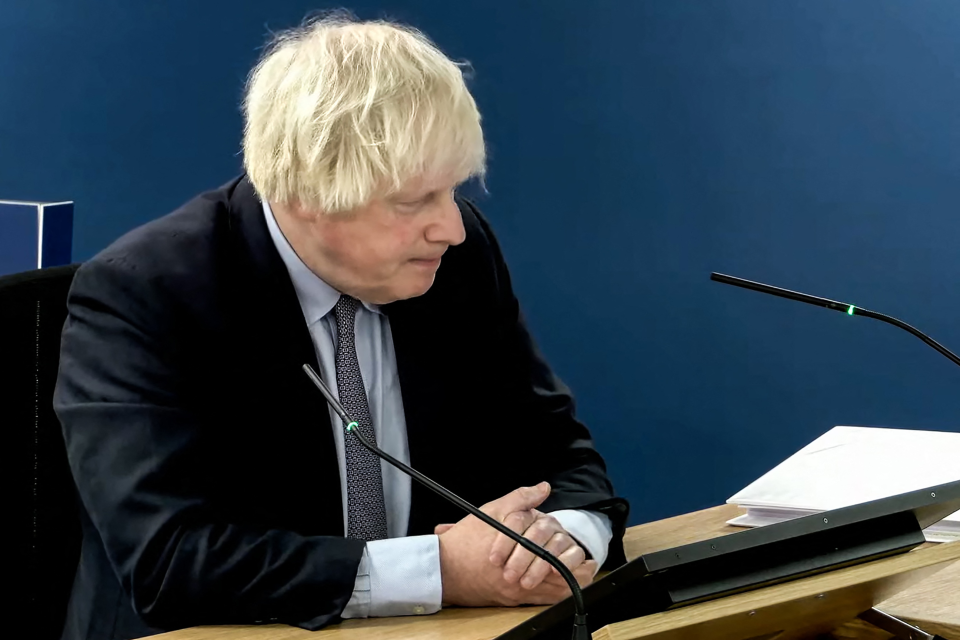
'Strong arguments against lockdown'
10:43 , Rachael Burford
The idea of national lockdowns were "clearly something that we considered very hard at the time", says Boris Johnson.
There were "strong arguments against going too early into lockdown", he adds, particularly when it came to the first lockdown in March 2020.
There were two arguments against the restrictions - the issue of "behavioural fatigue" and "the risk of bounce back".
"They were made powerfully and they certainly had a big effect on me," he says.
"When it came to the balance of needing to protect the public and protect the NHS and lockdowns it was incredibly difficult."
Four women removed from inquiry
10:38 , Rachael Burford
Four women were removed from the hearing as Boris Johnson began his evidence.
Baroness Heather Hallett ordered ushers to take the protesters outside after they interrupted the beginning of the ex-PM's evidence.
Afterwards the demonstrators told reporters that they stood to hold up signs that read: "The Dead can't hear your apologies."
Speaking outside Dorland House in west London, Kathryn Butcher, 59, who lost her sister-in-law in the pandemic, said: "We didn't want his apology.
"When he tried to apologise we stood up. We didn't block anybody. We were told to sit down.
"We didn't sit down straight away. One of us stayed standing, so the rest of us came out in solidarity."
Where are the Whatapps?
10:20 , Rachael Burford
Johnson is being questioned about his missing Whatsapp messages.
There are around 5,000 messages that have not been provided to the inquiry.
They were sent between January 30 2020 and June 2020.
He is presented with a screenshot of a message sent by Siman Case in 2021, who said the PM is "mad" if he doesn't think his messages will come out in a future inquiry.
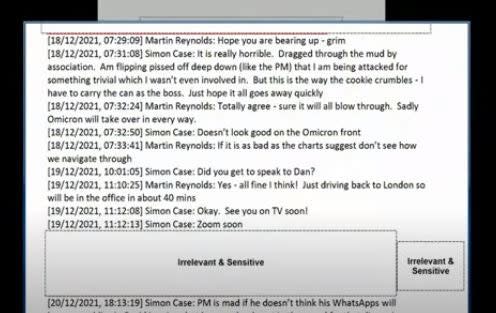
Inquiry needs to 'get answers'
10:12 , Rachael Burford
Mr Johnson says he is grateful to the "hundreds of thousandsof healthcare workers and many other public servants" who worked throughout the pandemic.
He says: "People in all walks of life who helped protect our country, throughout the dreadful pandemic, I do hope that this inquiry will help to get the answers to the very difficult questions that those victims and those families are are rightly asking so that we can protect ourselves better...help protect ourselves better in the future and prevent further suffering."
Boris Johnson apology interrupted by protester
10:08 , Rachael Burford
Boris Johnson begins his evidence saying he is "deeply sorry" to Covid victims and their families.
But his apology is briefly interrupted by protesters who are being ejected from the hearing.
Boris Johnson sworn in
10:02 , Rachael Burford
Boris Johnson is now being sworn in and his evidence is expected to start shortly.
'Basically feral': What's been heard so far...
09:52 , Rachael Burford
The inquiry has heard a lot about Boris Johnson's style of leadership.
His former senior adviser Dominic Cummings claimed Mr Johnson asked scientists whether Covid could be destroyed by blowing a "special hairdryer" up people's noses.
He also alleged that the ex-PM said he would rather "let the bodies pile high" than hit the economy with further restrictions - a claim supported by former senior aide Lord Udny-Lister, but which Mr Johnson has previously denied.
Meanwhile, extracts from the diaries of former chief scientific adviser Sir Patrick Vallance suggested Mr Johnson wanted to let Covid "rip" and believed it was just "nature's way of dealing with old people".
Cabinet Secretary Simon Case said Mr Johnson and his inner circle were "basically feral", in messages shown to the inquiry.
But other key figures have defended aspects of his record, including Levelling Up Secretary Michael Gove.
In an extract of his written statement published in January, Mr Johnson said it was his "duty" to weigh up whether lockdown had done more harm than good.
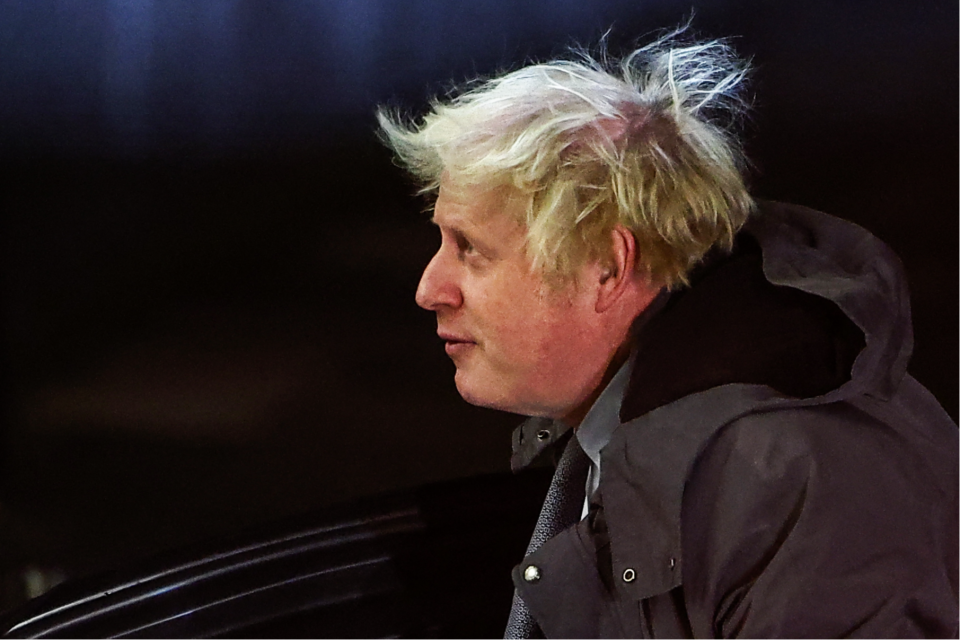
Missing messages
09:30 , Rachael Burford
Ahead of his appearance Boris Johnson has denied deleting WhatsApp messages.
It's emerged he had not been able to provide the inquiry with any communications from February to June 2020 - when Britain was plunged into the first Covid lockdown.
Technical experts had been trying to recover messages from his old mobile phone to hand them to the inquiry.
Mr Johnson was originally told to stop using the device over security concerns after it emerged his number had been online for years.
He then reportedly forgot the passcode, but it was believed that technical experts had succeeded in helping him recover messages for the inquiry.
The Times revealed that he has not been able to provide the inquiry with any communications spanning the early days of the pandemic and most of the first lockdown.
The paper reported that he told Baroness Heather Hallet's inquiry that technical experts have not been able to retrieve WhatsApp messages from between January 31 and June 7 2020.
A spokesman for the former prime minister said: "Boris Johnson has fully co-operated with the inquiry's disclosure process and has submitted hundreds of pages of material.
"He has not deleted any messages.
"The Times report refers to a technical issue in recovery of material that is for the technical team to address."
Protesters gather at inquiry
09:07 , Rachael Burford
Boris Johnson arrived three hours early for his appearance at the inquiry.
It meant he just dodged the groups of protesters that have gathered outside.
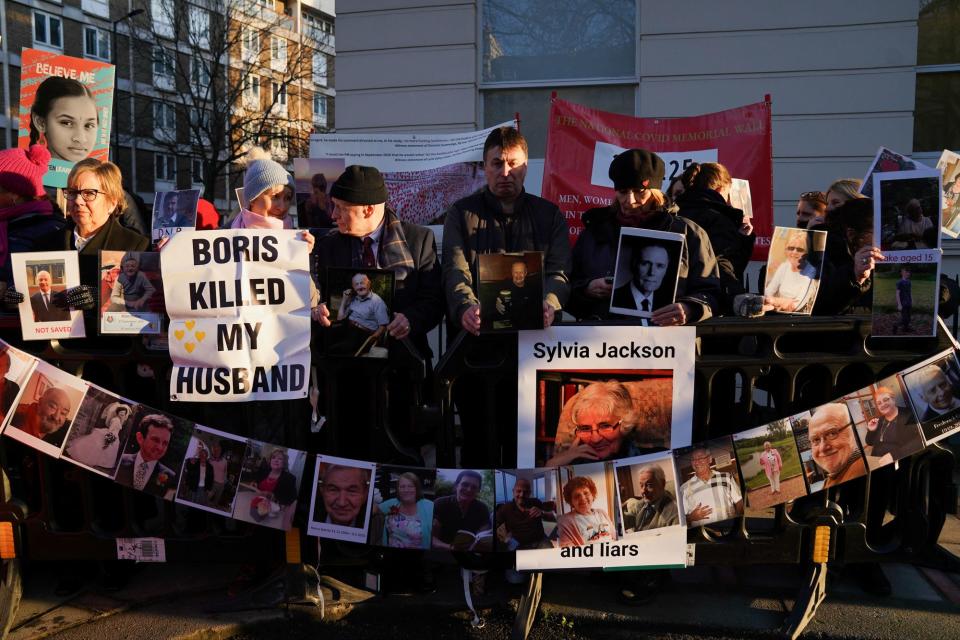
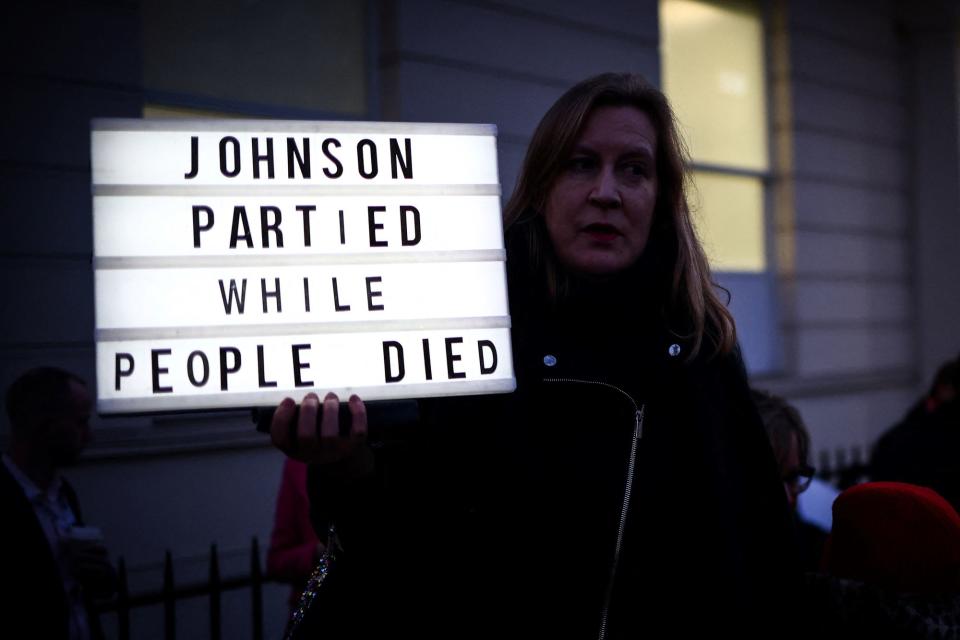
'Let the bodies pile high'
08:57 , Rachael Burford
Policing minister Chris Philp is on the morning media round ahead of Boris Johnson's grilling at the Covid inquiry.
He defended the ex-PM's record during the pandemic telling Sky News: "We were in uncharted territory and he was trying, as far as I can see, to make the right decisions in a very difficult, fast-moving situation."
But he added: "There's no doubt, of course, looking back with hindsight you can look at things and say 'well, that could have been done better'."
Mr Philp also said that if Mr Johnson had made the reported "let the bodies pile high" comment during the pandemic that would have been "inappropriate" and the wrong language for a leader to use.
"If he did say it, I think it was inappropriate and wrong language, even if used in a private meeting," Mr Philp said.
